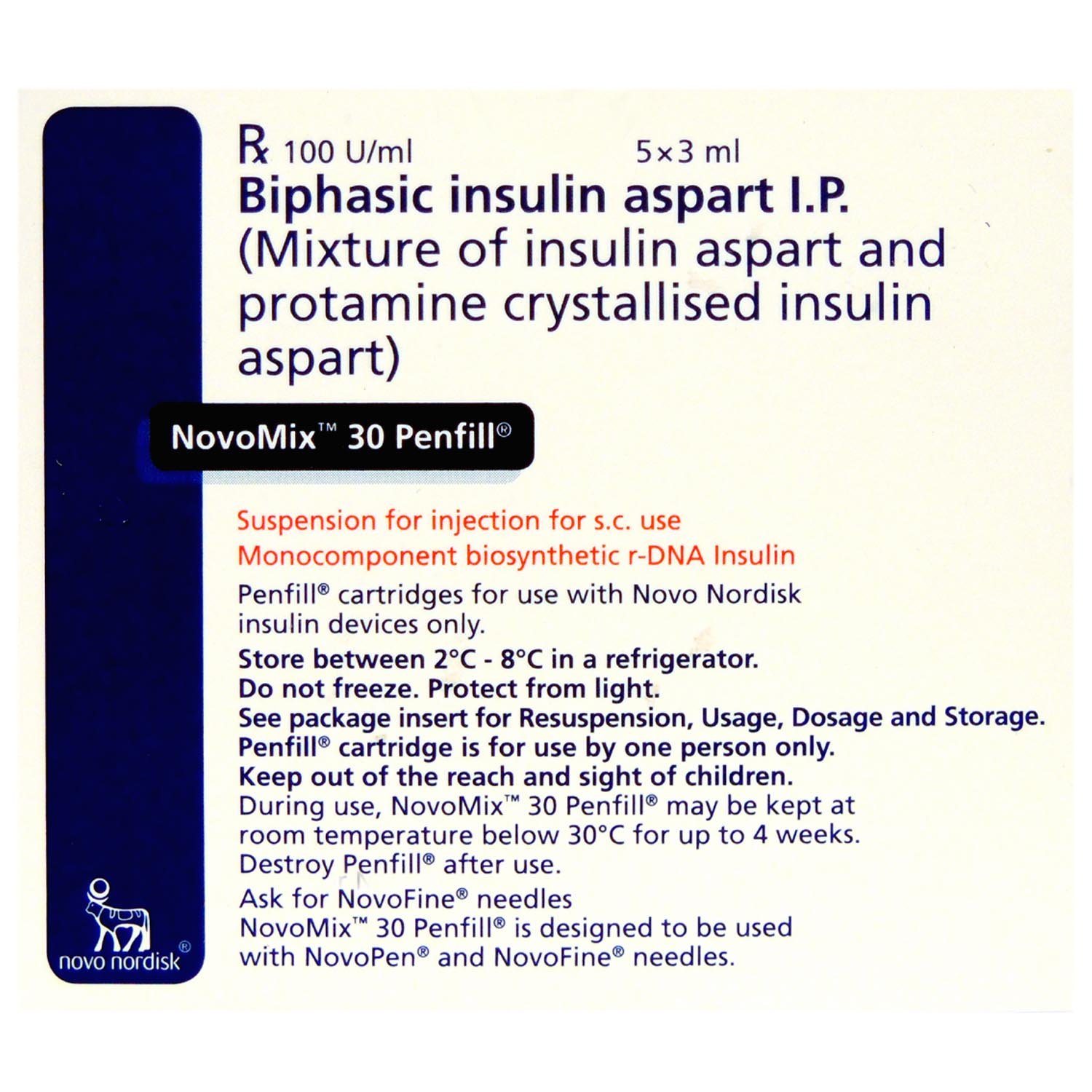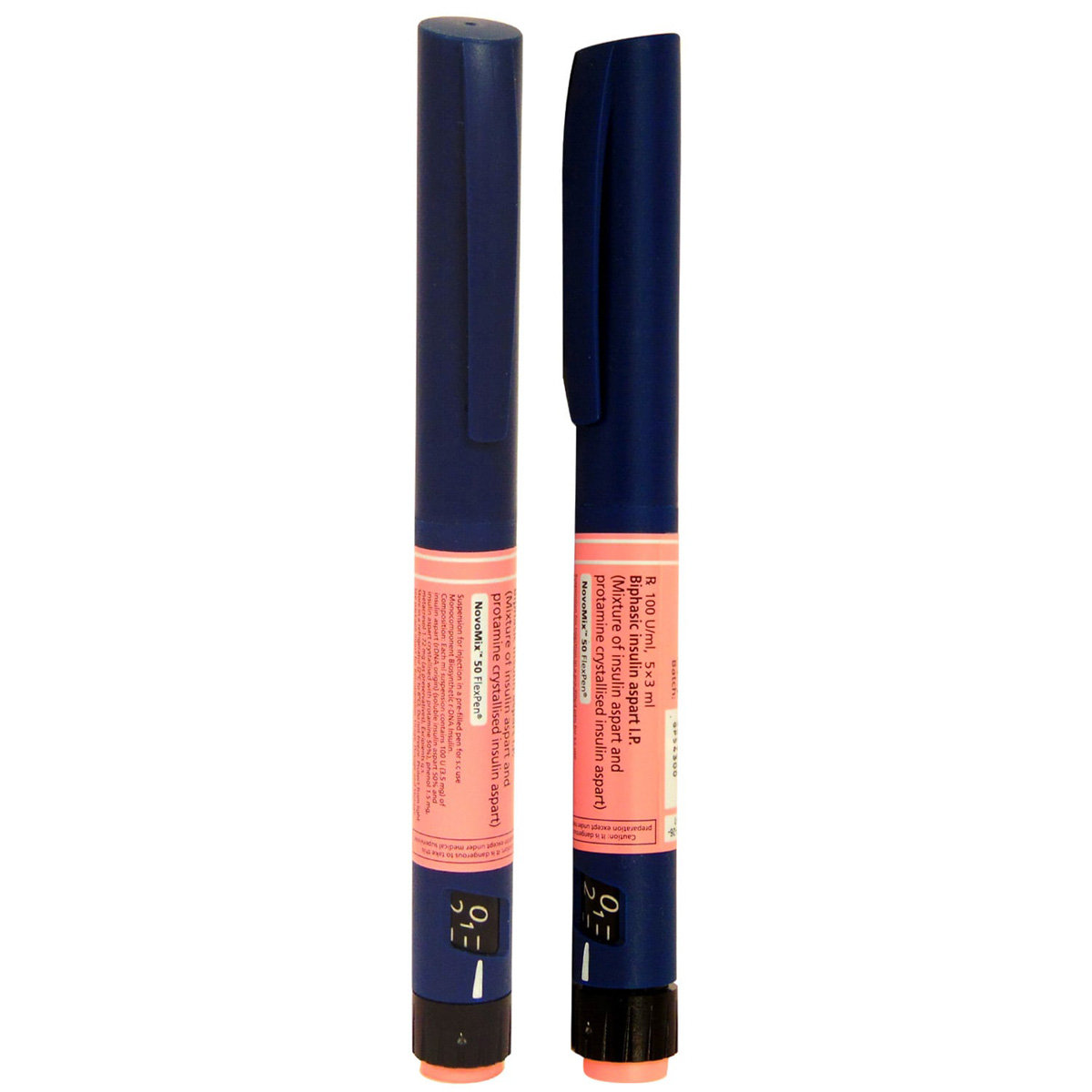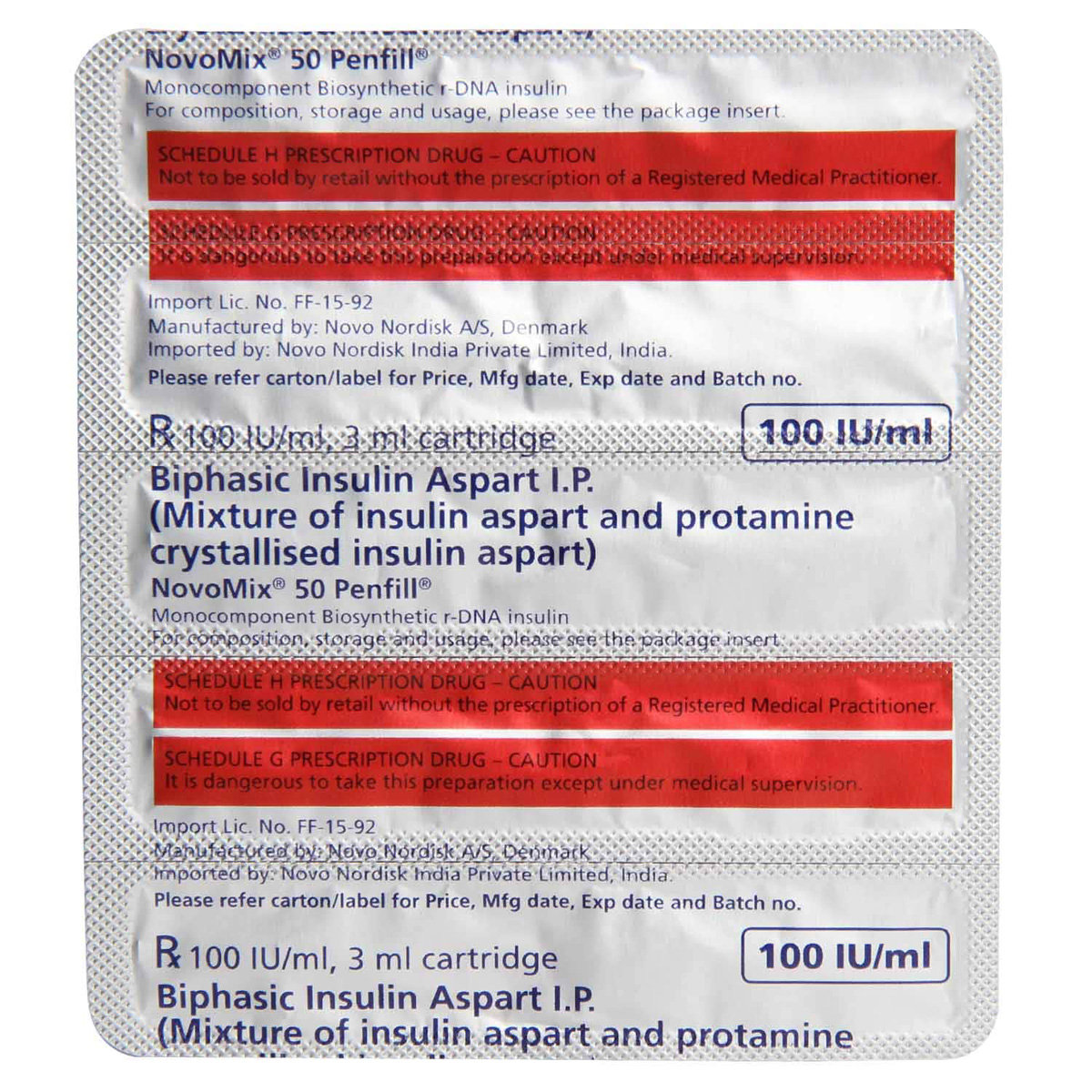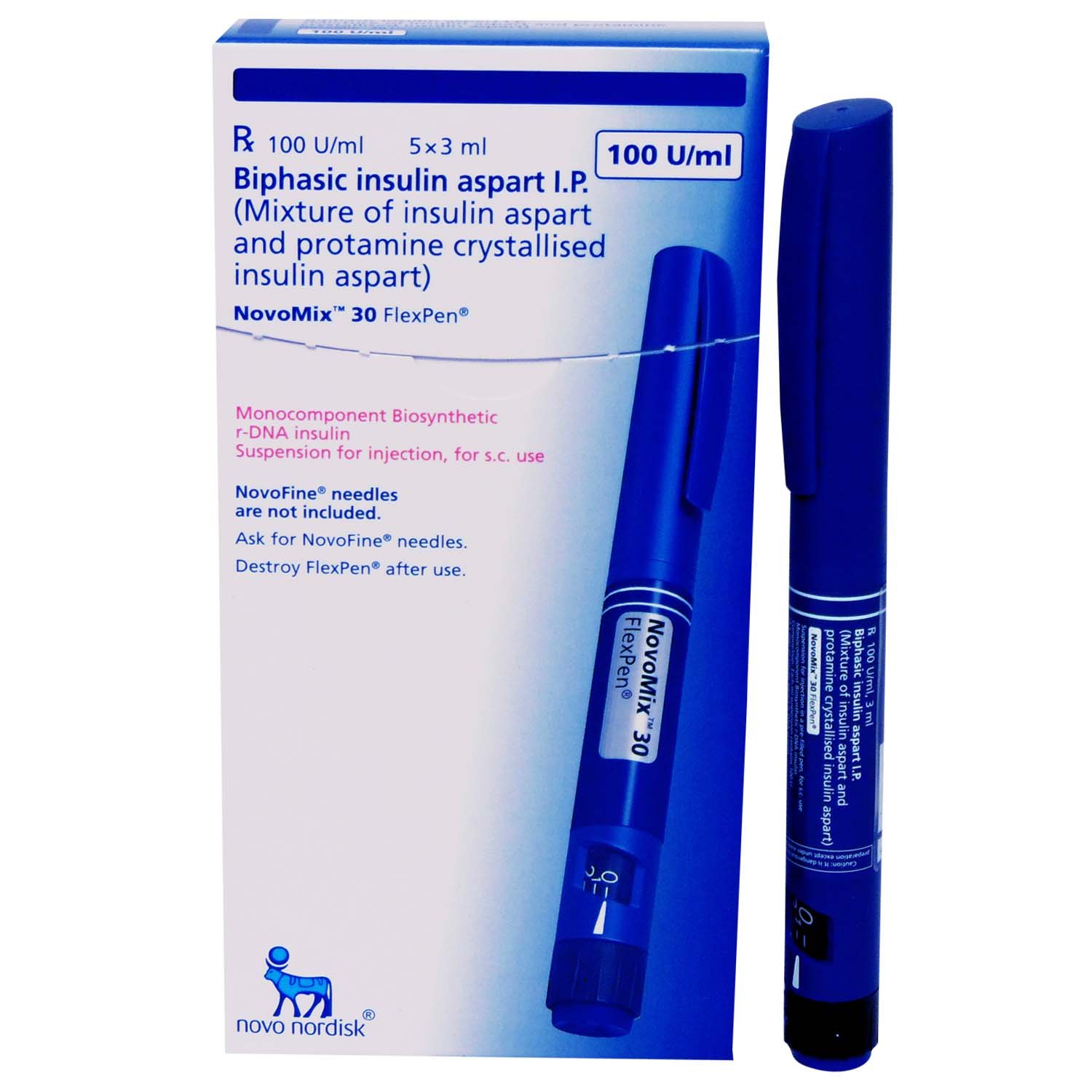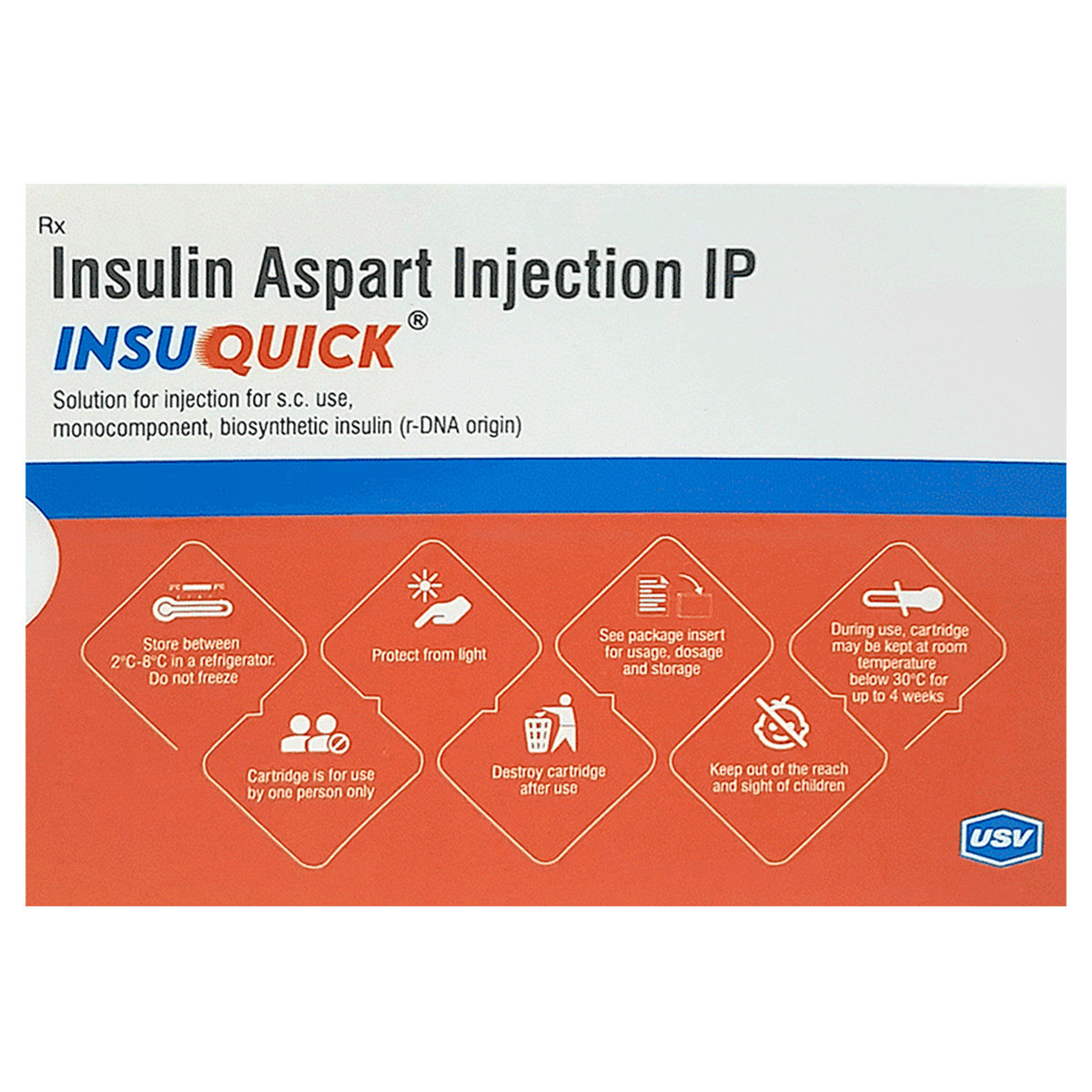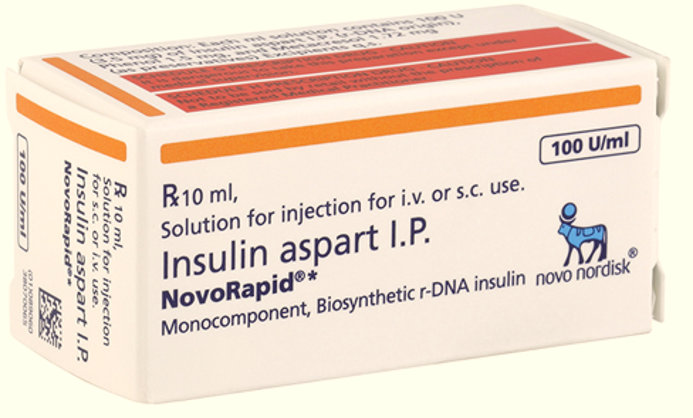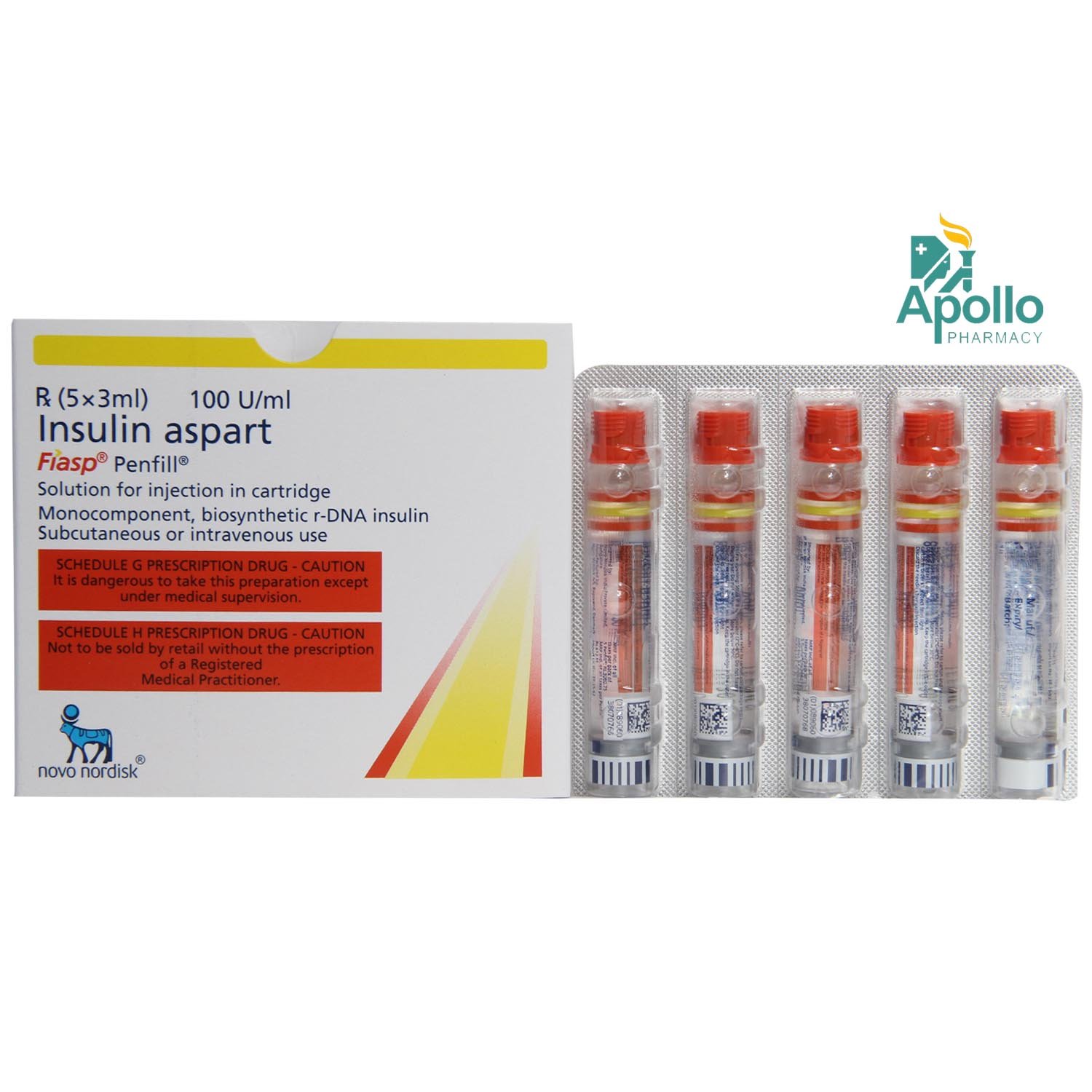Insulin Aspart
About Insulin Aspart
Insulin Aspart used for the treatment of both type 1 and type 2 diabetes mellitus. It maintains blood sugar levels in adults and children (above 2 years of age). In Type 1 Diabetes Mellitus, the body does not produce enough insulin to regulate blood sugar levels. In type 2 diabetes mellitus, either the body stops producing enough insulin (a hormone that helps lower blood sugar levels) or there is resistance to the action of insulin. As a result, insulin is produced in large quantities, but it is unable to function properly on the body's organs.
Insulin Aspart contains insulin aspart that works by promoting the recovery of sugar in muscle and fat cells and suppressing sugar production in the liver. Together, Insulin Aspart confirms rapid and stable sugar control.
Not everyone who is taking Insulin Aspart will get these side effects. You may experience rash, injection site allergic reaction, weight gain, edema (tissue swelling or fluid overload), skin thickening at the injection site, low blood glucose levels, and itching. Most of these side effects of Insulin Aspart do not require medical attention and gradually resolve over time. However, if the side effects are persistent, reach out to your doctor.
Insulin Aspart should be taken 15 minutes before food or as advised by your doctor. It should be administered subcutaneously (in the upper thigh, abdomen, upper arm, or buttocks) only. Your doctor will explain how to inject the medicine by your own. However, if it is difficult to inject the medicine, ask a healthcare professional to administer it. Along with Insulin Aspart, you should take a healthy diet, do regular exercise, and maintain weight as advised by your doctor.
Inform your doctor if you are allergic to Insulin Aspart. Do not take Insulin Aspart if you have any low blood glucose levels, kidney, liver, or heart problems, or problems with alcohol or other prescription or recreational drugs. Try not to stop receiving Insulin Aspart of your own. Let your doctor know about this, as it may cause withdrawal symptoms. Insulin Aspart is a cold chain medicine, and so it must be stored in the refrigerator between 2-8 degrees Celsius, or else its efficiency might get lost. Do not store in the freezer or the fridge.
Uses of Insulin Aspart
• Diabetes Management: Insulin Aspart is primarily used to regulate blood glucose levels in individuals with diabetes mellitus, helping to keep them within a healthy range.
• Postprandial Blood Sugar Control: Insulin Aspart effectively manages postprandial (after meal) blood sugar spikes through its combination of intermediate and short-acting insulin.
• Type 1 and Type 2 Diabetes Treatment: Insulin Aspart is prescribed for patients with Type 1 and Type 2 diabetes who are unable to achieve adequate glycemic control with oral hypoglycemic agents alone.
Medicinal Benefits
- Insulin Aspart works by ensuring rapid and stable sugar control. It prevents the risk of having severe complications of diabetes. It stimulates the recovery of sugar in muscle and fat cells and thus suppresses the production of sugar in the liver.
- Insulin Aspart helps in improving the glycemic control, which in turn decreases the risk of progression of complications of diabetes like damage of the retina, damage to the kidney, damage to nerve cells, delayed wound healing, diabetic foot ulcer and others.
- Insulin Aspart offers the flexibility to adjust insulin intake based on carbohydrate consumption and blood glucose levels, ensuring tailored diabetes management. The
- The Penfill format facilitates precise and convenient dosing using an insulin pen device, thereby enhancing the ease of use for diabetic patients.
Directions for Use
- Administered Insulin Aspart 5-10 minutes before taking a meal or as advised by your doctor.
- Follow your doctor's instructions on the dosage and timing of this medication.
- Check the label for directions and use it as advised by the doctor.
- Choose an injection site such as the thigh, upper arm, or abdomen, pinch the skin, and inject the recommended dose at a 45-degree angle slowly and steadily.
- Rotate the injection site every time.
- Do not inject into skin that is red, bruised, or hard.
- Do not reuse or share needles.
Side Effects of Insulin Aspart
- Rashes
- Injection site allergic reaction
- Weight gain
- Swelling
- Skin thickening at the injection site
- Low blood glucose levels
- Itching
Drug Warnings
- Inform your doctor if you are allergic to Insulin Aspart.
- Do not take Insulin Aspart if you have any low blood glucose levels, kidney, liver, or heart problems, or problems with alcohol or other prescription or recreational drugs.
- Try not to stop receiving Insulin Aspart of your own. Please inform your doctor about this, as it may cause withdrawal symptoms.
- Insulin Aspart may decrease the level of potassium, leading to a state of hypokalemia that, if left untreated, may lead to respiratory paralysis, irregular heartbeat rhythm, coma, and even death.
- Insulin Aspart is for subcutaneous (under the skin) use only.
- If you are switching to a different insulin brand or using a different method of injection, it should be done under strict medical supervision.
- Cases of heart failure have been reported when pioglitazone was used with insulin, especially in patients at high risk of cardiac heart failure.
- The first symptoms of hyperglycemia (high blood sugar levels) may include excessive thirst, dry mouth, increased frequency of urination, nausea, vomiting, drowsiness, flushed dry skin, loss of appetite, and an acetone odour in the breath. You should closely monitor these symptoms.
- It is advisable not to consume alcohol, as it may either increase or decrease your blood glucose level.
- Care should be taken while travelling across more than two time zones. Your doctor may adjust your insulin schedule.
- Insulin Aspart is a cold chain medicine, and therefore it must be stored in the refrigerator at a temperature between 2 °C and 8 °C; otherwise, its efficiency may be compromised. Do not store in the freezer or the fridge.
- It is always important to check the expiry date of the medicine. Discard the medicine if it reaches the expiry date.
- Insulin Aspart should not be administered intravenously (into the vein).
Drug Interactions
Drug-Drug Interactions: Insulin Aspart may have an interaction with drugs that may increase the risk of antiarrhythmic (disopyramide), hemorrheologic agents (pentoxifylline), antidiabetic (pramlintide), bleeding disorder drugs (octreotide), antipsychotic (propoxyphene, phenothiazines), female sex hormones (progestogen, oestrogen), thyroid hormones (levothyroxine), anti-asthmatics (albuterol, epinephrine, terbutaline), an antidepressant (fluoxetine, lithium), lipid-lowering pills (reserpine, niacin, clonidine, fenofibrate, guanethidine), pain killers (aspirin), antibiotics (isoniazid), blood sugar enhancing pills (glucagon), male hormone testosterone analogue (danazol), antibiotic (pentamidine).
Drug-Food Interactions: Insulin Aspart may interact with an ayurvedic, homoeopathy, Unani, herbal supplements or OTC items. Tell your doctor if you are using these products. Try to avoid intake of alcoholic beverages with Insulin Aspart as it may increase or decrease your blood sugar level.
Drug-Disease Interactions: Insulin Aspart should not be given to patients with kidney disease, liver disease, low blood sugar/glucose level (hypoglycaemia), and low potassium level (hypokalaemia).
Drug-Drug Interactions Checker List:
Safety Advice

Alcohol
unsafeYou are recommended not to consume alcohol along with Insulin Aspart to avoid unpleasant side-effects. Alcohol may either decrease or increase the blood sugar level which can be fatal.

Pregnancy
safe if prescribedInsulin Aspart can be used during pregnancy. Your insulin dose may need to be changed during pregnancy and after delivery.

Breast Feeding
safe if prescribedInsulin Aspart can be given safely to nursing mothers but only under the supervision of a physician.

Driving
unsafeDrive with caution, Insulin Aspart usually causes drowsiness and affects driving ability. Your ability to concentrate and react may be reduced if you have hypoglycaemia (low blood sugar).

Liver
cautionInsulin Aspart to be taken with caution, especially if you have a history of liver disease. The dose may have to be adjusted by your doctor.

Kidney
cautionInsulin Aspart to be taken with caution, especially if you have a history of kidney disease. The dose may have to be adjusted by your doctor.

Children
safe if prescribedInsulin Aspart can be given safely to children provided; dose has to be prescribed under the supervision of a doctor.
Habit Forming
Diet & Lifestyle Advise
- Exercise may lower your body’s need for insulin during and sometimes after physical activity.
- Exercise may also speed up the effect of an insulin dose, especially if the exercise involves the area of the injection site (for example, the leg should not be used for injection just before running).
- Discuss with your doctor how to adjust your insulin regimen to accommodate exercise.
- Avoid eating sugar food and prefer food cooked food low in calories.
- When travelling across more than two time zones, you should consult your doctor about making adjustments to your insulin schedule.
Special Advise
- Your doctor may tell you to have a normal potassium level as prolonged administration causes a life-threatening condition of hypokalemia (low potassium).
- Always sterilize the injection site before administration of the drug.
Patients Concern
Disease/Condition Glossary
Diabetes: Diabetes is a chronic or lifelong disease that prevents the body from utilizing insulin properly. Insulin is the hormone that controls sugar levels in the blood. Diabetes is a condition in which blood glucose levels are above normal. It is of two types, namely: type-1 and type-2 diabetes. Type-1 diabetes is a condition in which the pancreas produces little or no insulin. Type-2 diabetes affects the way the body processes sugar. Symptoms of diabetes include lack of energy, tiredness, frequent urination, excess thirst, dry mouth, blurry vision, constant hunger, weight loss, and itchy skin.
FAQs
Insulin Aspart is used to treat diabetes mellitus. It works by ensuring rapid and consistent sugar control.
Insulin Aspart works by replacing the insulin that is normally produced by the body. It helps move sugar from the blood into other body tissues where it is used for energy. Insulin Aspart also prevents the liver from producing more sugar.
Insulin Aspart typically begins working after 10-20 minutes, and will last for between 3 and 5 hours.
Cold sweat; cool pale skin; headache; rapid heartbeat; feeling sick; feeling very hungry; temporary vision changes; drowsiness; unusual tiredness and weakness; nervousness or tremor; feeling anxious; feeling confused; difficulty in concentrating are some of the common signs of the low blood sugar level in an individual.
If you experience low blood sugar, eat glucose tablets or another high sugar snack (e.g. sweets, biscuits, fruit juice). Measure your blood sugar if possible and rest. Always carry glucose tablets or high sugar snacks with you. You should give a call to any of your family members if you are feeling dizziness or drowsiness.
Local allergic reactions (pain, redness, hives, inflammation, bruising, swelling and itching) at the injection site may occur. These usually disappear after a few weeks of taking your insulin. If they do not disappear, or if they spread throughout your body, talk to your doctor immediately.
Insulin Aspart can be given to treat both the condition of type 1 and type 2 diabetes mellitus. However, your doctor will decide whether Insulin Aspart can be given to you or not depending on your present condition. Insulin Aspart should be avoided in patients who are allergic to Insulin Aspart or other forms of insulin, patients with kidney disease, liver disease, low blood sugar/glucose level (hypoglycaemia), and low potassium level (hypokalaemia).
Cut back on foods high in sodium, alcohol, fried foods, and high-carb food and drinks like sugary drinks, drinks with added sugar, white rice and starchy vegetables.
Insulin Aspart should not be discontinued without a doctor's consultation as stopping Insulin Aspart may cause severe hypoglycaemia (low blood sugar) and ketoacidosis (buildup of acid in the blood). Consult the doctor if you feel uncomfortable after taking Insulin Aspart.
The injection site should be changed to prevent skin changes like lumps under the skin. Insulin Aspart may not work well if injected into the lumpy area.
Maintain a healthy diet and exercise regularly. Limit sugar intake and avoid smoking & alcohol consumption. Manage stress by doing meditation or yoga.
Hypoglycaemia (low blood sugar) may occur because you inject too much insulin, miss or delay meals, do not eat enough, eat food containing less carbohydrate than normal, drink alcohol, lose carbohydrates due to vomiting or diarrhoea, do more exercise than usual or a different type of physical activity, are recovering from an injury, illness, operation or stress, or are taking/have stopped taking other medicines.
Check the label for directions and use Insulin Aspart as advised by the doctor. Talk to the doctor if you have any concerns. Insulin Aspart should be taken immediately before a meal. Eat a meal or snack within 10 minutes of the injection to avoid low blood sugar. When necessary, Insulin Aspart can be given soon after a meal.
Insulin Aspart belongs to the class of medicines called insulin analogues used to improve glycaemic control.
Insulin Aspart contains Insulin aspart which is produced in a genetically modified strain of Saccharomyces cerevisiae (baker's yeast) using rDNA technology.
Insulin Aspart may cause weight gain due to a decrease in glucosuria (excretion of glucose through urine). Consult the doctor if you have any concerns.
Insulin Aspart may be needed for the rest of your life if you have type 1 diabetes as your body is not able to produce sufficient insulin. However, if you have type 2 diabetes your doctor might prescribe Insulin Aspart for a short duration based on your condition.
Yes, Insulin Aspart may cause hypoglycaemia (low blood glucose levels). Regularly monitor blood sugar levels and take a source of sugar such as glucose biscuits, candy or fruit juices if you experience symptoms of hypoglycaemia cold sweat, headache, rapid heartbeat, feeling sick, drowsiness, unusual tiredness, and weakness.
Yes, Insulin Aspart is a fast-acting insulin. It helps control immediate post-meal high blood glucose levels. You should eat a meal within 5-10 minutes after taking a dose of Insulin Aspart.
Insulin Aspart is safe to be used in pregnancy if prescribed by the doctor. Careful monitoring of blood sugar levels is advised.

